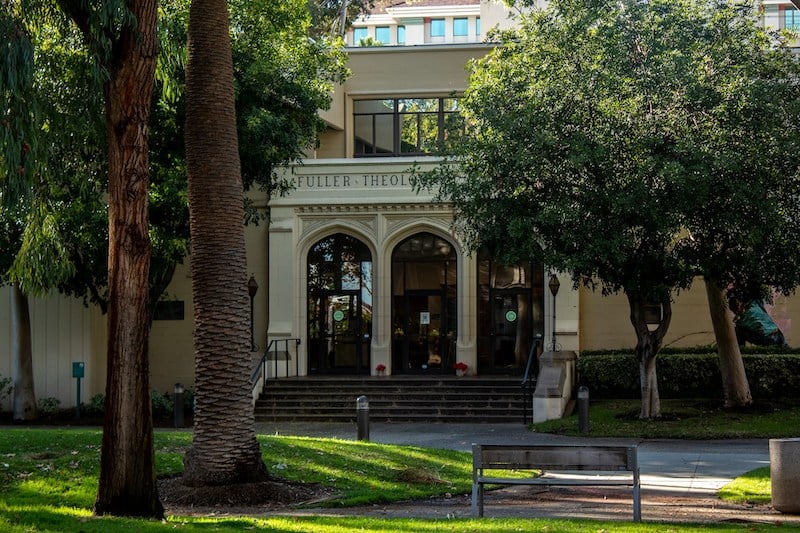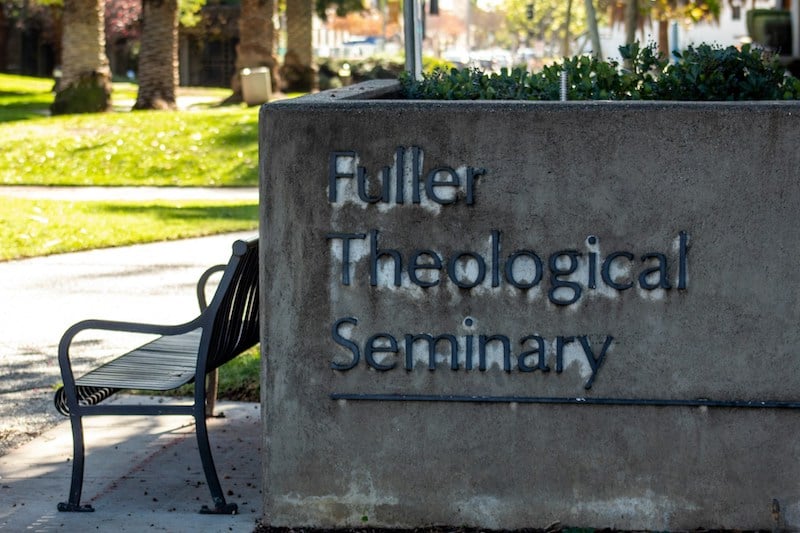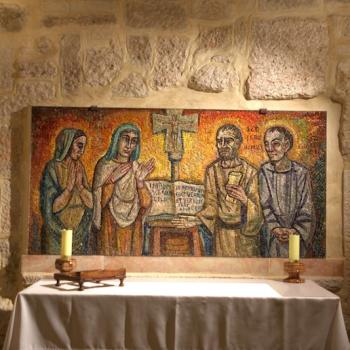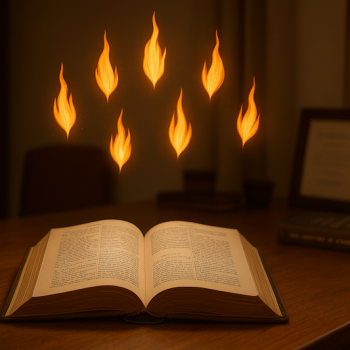
I earned a Master of Arts in Theology and Ministry in 2020 and a Master of Arts in Global Leadership in 2023 from Fuller Theological Seminary. Without a doubt, Fuller Seminary has been like family to me and represents one of the most formative seasons of my life. As a double graduate of Fuller Seminary and the Alumni Regional Contact for the Southeastern Pennsylvania area, I have a deep, vested interest in how Fuller Seminary was going to respond to both internal and external pressures to reconsider its theological convictions. Though I genuinely have friends on the LGBTQIA+ scale, and interact with others daily, I am someone who has long tried to compassionately bridge the gap to the marginalized, but well-framed and thought out theological convictions matter in a confusing world that is looking to undermine the image of God in which we all carry as males and females. Personally, I was genuinely encouraged to see the trustees recently reaffirm the school’s historic theological convictions, especially in light of recent pressures to revise long-held views on marriage and sexuality.
The Pressures To Conform
The pressure to change their stance on this conviction has been increasing in the past few years. From what I could find, in 2021, Joanna Maxon and Nathan Brittsan filed lawsuits against Fuller Seminary after the school ended their enrollment for knowingly violating the community standards, specifically, the policy requiring students to uphold the seminary’s position on marriage as a covenant between one man and one woman. The court ultimately sided with the seminary, affirming that the students were not expelled merely for violating sexual standards, but because they had entered into permanent same-sex relationships, which directly conflicted with the school’s community covenant. Fuller Seminary has been committed to these convictions, for example, when it came out that Professor Vince Bantu was having ongoing sexual misconduct in other schools, Fuller Seminary fired him. Ruth Schmidt, a student and senior director at Fuller Seminary’s Brehm Center, experienced a shift in her personal convictions and came to believe it was acceptable to identify as gay and serve in church leadership. As a result, she felt she could no longer, in good conscience, affirm Fuller’s community standards. Consequently, she was released from her position. Despite the pressure in a changing world, Fuller Seminary has a history of affirming its standards and convictions. You can read Fuller Seminary’s standards here.
A New President With A New Approach
David Emmanuel Goatley started as the President at Fuller Seminary on January 3, 2023. One of the first things he seemingly did, in 2024, was establish a Human Sexuality Task Force to engage in dialogue around convictions related to same-sex relationships, despite the institution’s previous affirmation of its historic orthodox stance on the issue. According to articles, Fuller Seminary’s President, David Goatley, appointed this task force to review the school’s sexual standards after the firing of Ruth Schmidt. I have failed to understand why they/he thought this was needed. The school board quickly released a statement affirming their historic conviction, but it didn’t stop the work of the established task force. Since becoming president, Dr. David Goatley and Fuller Seminary have introduced a number of significant changes. Several traditional degree programs have had their credit requirements reduced—including one of the degrees I earned—and the seminary has sold or released several long-held campus buildings. These sort of moves, made by many colleges, are not ones I enjoy seeing. Additionally, rather than doubling down on their historic theological convictions, the institution has prioritized rebranding efforts. In my view, this shift in focus is unlikely to provide the clear direction Fuller Seminary truly needs.

A Short History of Fuller Seminary
Charles E. Fuller, a radio evangelist known for the Old Fashioned Revival Hour, and Harold John Ockenga, pastor of Boston’s Park Street Church and a respected practical theologian, partnered to establish a seminary that was both intellectually rigorous and culturally engaged—yet firmly rooted in evangelical conviction and practice. The original faculty included several well-known theological figures in the history of American evangelicalism. The idea for Fuller Seminary was born between these two men and two others in 1947. Named after Henry Fuller, the father of Charles E. Fuller, the seminary’s founders aimed to push back against the separatist, liberal, and often anti-intellectual tendencies of fundamentalism that had taken root during the 1920s to 1940s. There have been various seasons in the school’s history, some richer than others. Though Fuller Seminary has a long history of holding convictions that sometimes placed it at odds with more fundamentalist church movements, such as their conversion on inerrancy vs authenticity, it has traditionally remained aligned with broader evangelical values and commitments (see more on Wikipedia). Prominent theologians and leaders who have served on the faculty at Fuller Seminary include George Eldon Ladd, John Goldingay, Richard Mouw, Joel B. Green, Amos Yong, Ray Anderson, Daniel Fuller, Lewis Smedes, David W. Augsburger, Glen Stassen, Charles Scalis, Charles Kraft, Charles Van Engen, and others.
Fuller Seminary Reaffirms Its Standards and Convictions
Fuller Seminary has reaffirmed its standards and convictions on sexuality. You can read their beliefs and community standards online. This affirmation includes seeing scripture “not the church, [as] the final authority for Christian faith and practice.” It also means upholding a standard that sees homosexuality as “inconsistent with the teaching of Scripture.” Though they have affirmed their orthodox statement, Daniel Silliman is correct: “The decision is unlikely to satisfy Fuller’s critics on either side.” Christian Leader Ed Stetzer, who is also notably the Dean and Professor of Leadership and Christian Ministry at Talbot School of Theology at Biola University, is one of those who are not satisfied with Fuller Seminary’s statement. In response, Ed wrote an article on Church Leaders confronting Fuller Seminary for not going far enough. I am a huge fan of Stezer, but I think his article misses the target.
Ed Stezer Haphazardly Critiques Fuller Seminary’s Statement
Again, I could not ignore that Ed is the Dean and Professor of Leadership and Christian Ministry at Talbot School of Theology at Biola University when I read Ed Stetzer’s recent article on Church Leaders. I respect Ed’s leadership and his commitment to biblical orthodoxy, and I share his belief that clarity on issues like human sexuality matters deeply and must be reinforced, not ignored. However, I believe his critique overlooks some of the complexity. While I don’t think Fuller’s recent statement went far enough—and I’m unsure whether current leadership is committed to reinforcing their stated convictions—I do believe there’s a faithful way forward (not a so-called “third way”) that holds both conviction and engagement together. It’s a difficult path, but not an impossible and doesn’t need to be a compromised one. Ed doesn’t seem to leave room for that. And while I largely agree with his conclusions, his article needed a stronger theological and practical proof. He repeatedly states that the “middle way” won’t work, but offers little explanation as to why, saying it over and over doesn’t make it true. Fuller Seminary has held the both-and of many convictions for years. The inability to formulate a clear case weakens Ed’s critique and raises questions about the intent behind the piece. Orthodoxy matters—but so does how we articulate it, live it, and teach it in a complex and divided world. Like Ed, I want more clarity and courage from Fuller Seminary—and more thoughtful engagement from those who challenge it.
President David Goatley Responds To Ed Stetzer
In response to Ed Stetzer’s article, Fuller Seminary President David Goatley published his own piece on Church Leaders. While I appreciated his tone and some of his reflections, the article didn’t engage Ed’s critique directly—it felt more like a dance around the issue than a clear response. Maybe it was written more for the onlookers. At times, the article read as a justification for being controversial rather than offering clarity. To his credit, Goatley does a good job of highlighting Fuller’s unique identity and history of navigating theological tensions. He also points out that many recent reports on the issue have been incomplete or misleading. However, regrettably, he stops short of setting the record straight by addressing those inaccuracies point by point.
My Response to Stezer, Goatley, and the Statement
What’s missing is an explanation of why Fuller Seminary felt the need to revisit its historic understanding of marriage and sexuality in the first place. While I acknowledge that faithful Christians who study Scripture deeply sometimes arrive at different conclusions, I do think there is a clear conviction for honest students here. I also believe with Goatley that theological integrity and pastoral sensitivity are both essential in engaging these complex realities. Ed’s article could have done more to affirm that. However, even though I agree with Goatley’s emphasis on the messiness of ministry, the challenge of theological education, and the importance of an incarnational witness, these important truths don’t justify creating confusion where clarity is needed. Nor should we feel pressured to appease those who see things differently at the expense of conviction. Our missional and evangelistic calling does require us to bridge gaps with our neighbors, but it must be done from a place of faithfulness, not compromise. Seminary education is, first and foremost, discipleship, or it is a failure. Charity towards others is essential, but so is Holy Spirit conviction—especially if we hope to form strong disciples and leaders in a world increasingly defined by confusion and syncretism.
Closing Thoughts: Everyone is Watching
As pointed out in the Christianity Today article, “Fuller is the eighth-largest seminary in the United States and one of the largest without a denominational affiliation….Fuller also has about 400 full-time and 1,500 part-time students who come from more than 100 different denominations.” Many eyes are on Fuller Seminary in this season. In a world where denominational schools are pushing for more fundamentalism or liberalism (depending on the school), Fuller Seminary cannot fall victim to either polarizing threat. We need good, orthodox, academically intellectual seminaries that hold the line. At the same time, Fuller Seminary must be clear about defining its stance, because it is equally as threatening to lose oneself in the ability to clearly define truth, posture, and scriptural paradigm.
Fuller Theological Seminary was founded to hold both academic rigor and evangelical orthodoxy in tension, not to drift with cultural tides. While I’ve had my concerns about some recent shifts—like rebranding efforts and leadership changes—I still love my Fuller family and hope the seminary will continue to reclaim its distinct identity without compromising its foundational values.













